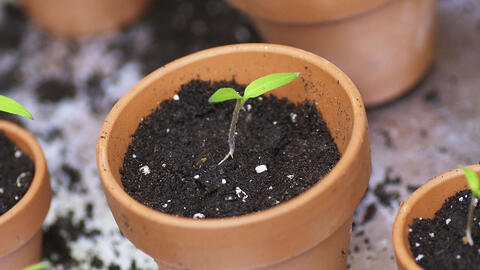Are your seeds not germinating? The 5 Most Common Reasons
Most vegetables and flowers are grown from seed – but things don’t always work out exactly as you imagine. Here, we take a look at the most common reasons why your seeds may not be germinating.

Seeds don’t always germinate as well as in this image – incorrect storage or unsuitable substrate can make seeds unusable
Apart from a few exceptions, like potatoes, and asparagus, most vegetables and almost all summer flowers are grown from seed. Every now and then, seeds might not germinate at all or only a few may sprout – and hobby gardeners are left wondering what the cause might be. Here, we explain the five most common causes.
Above all, seeds you harvest yourself may be incorrectly stored and no longer germinate reliably. Always store seed packets in a dark place with moderate humidity and cool temperatures between 32 and 50 degrees Fahrenheit. It’s important that the packaging is breathable, such as a paper bag. Plastic packets are not ideal: if the seeds are still not quite dry, they can begin to spoil. Larger, thoroughly dried seeds may be stored in screw-top jars. When you open little bags of seeds after purchase, they should then be stored in a screw-top jar or a plastic tub with a lid.
Check the expiration date on the seed package, as many seeds lose their ability to germinate after a few years: garlic, parsnips, and onions, for example, are only suitable for germination for around one year, carrots for up to two years, fennel, spinach and celery up to three, beans, , lamb’s lettuce and radish up to four years. Cucumber, certain cabbage species, pumpkin and tomato seeds can even still germinate after five years.
To check whether your seeds are still suitable for germination, you can carry out a germination test: place around 20 seeds on moist kitchen paper, roll it up and place it in a plastic bag with holes. Store this at room temperature and carry on checking how many seeds have germinated for the whole stated germination period. If more than half germinate, you can still use the seeds. If it’s less than a third, you should discard them and buy more.
- Incorrect seed storage
- Expired seeds
- Soil or propagation substrate too cold
- Dryness
- Wrong seed depth
- Seed tape not thoroughly moistened
Good substrate is essential for successful seed germination. Deeply loosened, finely textured soil with lots of humus and a low nutrient content is best – the less the young seedlings are “pampered” with nutrients, the stronger the root network will develop to be. You can also make potting soil yourself: a mixture of one third fine sieved compost, one third sand and one third sieved garden soil is ideal. Very heavy, loamy soil with a low humus content isn’t good for direct sowing, as the young seedlings will struggle to push through. It must be loosened well in advance and improved with plenty of humus. When sowing direct, it has also proven useful to cover freshly sown seed with fleece until it germinates – this retains the heat in the soil and ensures that strong sun does not cause the ground to dry out.

Sowing seeds at the right depth also plays a major role in the successful germination of plant seeds. The rule of thumb: the finer the seed, the shallower it must be sown. For example, if tiny carrot seeds are buried inches down into the soil, the energy reserves in the seeds will generally run out before the seedling manages to make it through the top of the soil. On the other hand, larger seeds sown at a very shallow depth tend to end up in the bellies of pigeons and crows or fail to root properly during germination.
If seeds sown directly outdoors experience delayed germination or only a handful manage to germinate, the reason may be that the soil is too cold. Depending on the type of vegetable or flower, it’s best to wait a couple weeks longer in spring to sow. The young plants sown into warmer soil often end up overtaking these early starters. Carrots, for example, germinate at 39 degrees Fahrenheit but their optimal germination temperature for good growth is between 64 and 71 degrees Fahrenheit. Seeds sown too early are often simply crowded out by weeds, as these grow better at lower temperatures. They often simply rot in the ground as they easily succumb to fungal infections in their swollen state.
One of the most common seed killers is a lack of water: if the seed bed isn’t kept consistently moist, the seeds cannot swell and therefore germinate. Although this often only leads to delayed germination, it can destroy a whole crop in the worst case scenario. Seeds are particularly vulnerable during germination: when they’ve already begun sprouting yet are unable to grow further due to a lack of water, they inevitably die.
Seed tape and seed discs are especially popular for plants with fine seeds as the seeds are already embedded into the cellulose at the ideal planting distance.

Mistakes are often made when using these tools: it’s very important that seed discs and tapes are thoroughly moistened before being positioned and covered with soil. The top layer of soil must be pressed down well and then thoroughly watered – this is the only way to ensure that all seeds come into contact with the soil so can germinate reliably. If you do not proceed as described, some seeds will be left high and dry, so to speak, and their roots will have nothing to hold onto.



